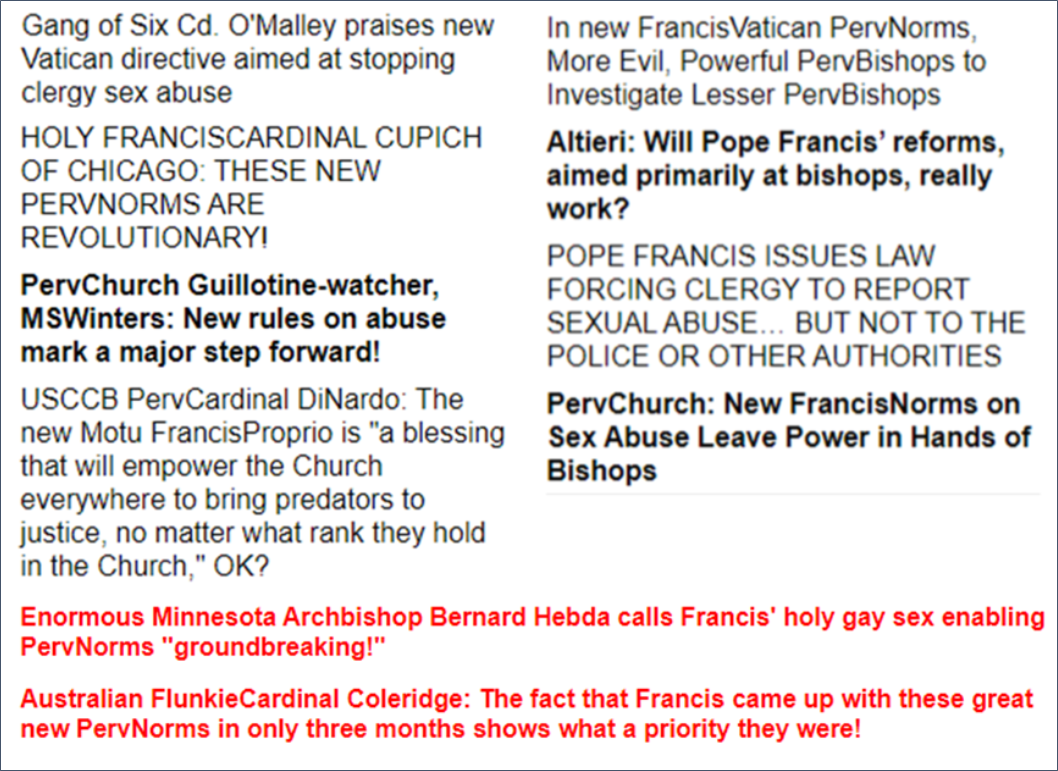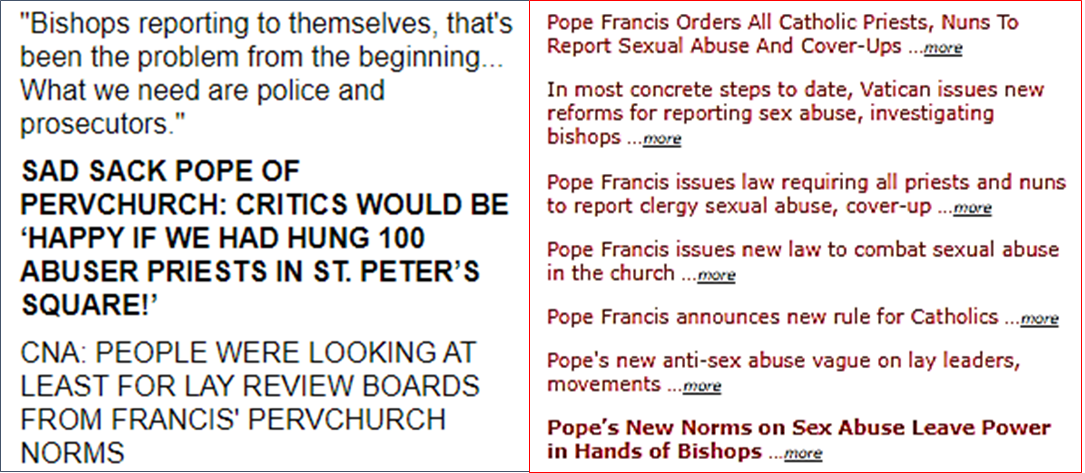Of course, much criticism already follows the new Bergoglian motu proprio – which is to be expected about anything Bergoglio says or does. But ChurchMilitant underscores its main shortcomings in the article below.
I add my own supplementary criticism: In the Sermon on the Mount, Jesus tells the crowd assembled to hear his words: “You are the light of the world. A city set on a mountain cannot be hidden… Just so, your light must shine before others, that they may see your good deeds and glorify your heavenly Father.” (Mt 5, 14,16)
While obviously meant by the pope to be an exhortation to his bishops, choosing this particular text to provide the title for his new Apostolic Letter (Vos estis lux mundi – You are the light of the world) on clerical and episcopal sex abuse is prima facie ludicrous – not to mention, gratuitously pompous – considering the circumstances that forced it to be issued…
It would have been more appropriate to use Matthew 18,6 as an epigraph – in which Jesus says, “Whoever causes one of these little ones who believe in me to sin, it would be better for him to have a great millstone hung around his neck and to be drowned in the depths of the sea.”
Pope’s new norms on sex abuse
leave power in the hands of the bishops
Closely resemble Wuerl-Cupich alternate proposal
presented to the US bishops in Baltimore last November
by Christine Niles

May 9,2019
VATICAN CITY (ChurchMilitant.com) - The pope's new motu proprio on sex abuse allows the bishops to investigate themselves, cutting laity out of any investigation and failing to direct clergy to report abuse to secular authorities.
Published Thursday, 'Vos Estis Lux Mundi,' places the metropolitan archbishop in charge of any investigation into allegations of abuse by brother bishops. The metropolitan's power is near-total.
In the initial stages, the metropolitan is given authority to reject a claim as unfounded and drop any investigation. "If the Metropolitan considers the report manifestly unfounded, he shall so inform the Pontifical Representative" — the papal liaison, who then informs the competent dicastery in Rome.
If the metropolitan believes the claim is founded, he is then placed in charge of overseeing all aspects of the investigation, including the following:
a) collect relevant information regarding the facts;
b) access the information and documents necessary for the purpose of the investigation kept in the archives of ecclesiastical offices;
c) obtain the cooperation of other Ordinaries or Hierarchs whenever necessary;
d) request information from individuals and institutions, including civil institutions, that are able to provide useful elements for the investigation.
Article 19 — the last article — gives brief mention of complying with state law on reporting requirements; however, nowhere in the motu proprio are clergy instructed to report abuse to secular authorities, leaving the investigation entirely within the ranks of the Church.
Critics are slamming the document as insufficient, noting its striking similarity to the Wuerl alternate sex abuse proposal heavily promoted by Cdl. Blase Cupich in Baltimore, Maryland in November. That plan also proposed placing sex abuse investigations of fellow bishops under the auspices of the metropolitan.
In the case of Cupich, he would be the metropolitan in charge of overseeing any investigation of brother bishops in his jurisdiction. Theodore McCarrick — laicized after being exposed as a serial homosexual predator — would have been the metropolitan in charge of investigating abuse by bishops, if the norms had been in place during his time in Washington D.C.
Archbishop Christophe Pierre, papal nuncio, stunned American bishops in Baltimore when, in his opening speech, he rejected the possibility of a lay board to investigate sex abuse. Pierre had been spotted dining and conferring privately with Cupich and Wuerl at the Marriott hotel, and both Wuerl and Cupich had been seen frequently together in Rome in the weeks leading up to the November Baltimore bishops meeting.
Although the majority of bishops, including DiNardo, were caught off guard by the turn of events — there was an audible gasp in the room when DiNardo announced that Rome wanted the votes on sex abuse reform delayed until the February synod — it was clear Cupich had already been aware of the plan. He was first on his feet to address the news with what seemed a prepared speech, insisting that the Holy Father is "serious" about getting to the bottom of the McCarrick abuse scandal and that bishops should spend the remaining months discussing next steps.
Those "next steps" never came at the February summit, widely criticized for its failure to propose concrete steps to address abuse at the hands of bishops.
The only significant difference in the motu proprio from the Wuerl/Cupich proposal is that the motu proprio includes adult seminarians and religious in the same criminal categories as minors and vulnerable adults. Even so, a seminarian or religious who alleges abuse at the hands of a bishop must still submit to the investigative authority of the metropolitan, who then submits his final determination to the Holy See.
Confidence in Church leadership is at an all-time low, after revelations last summer exposing McCarrick as a serial sexual predator, after having been the public face of the response to the sex abuse crisis in 2002. He played a key role in formulating the Dallas Charter, meant to hold clergy accountable for abuse — all while abusing minors, seminarians and clergy himself.
The publication of the Pennsylvania grand jury report in mid-August, followed by Abp. Carlo Maria Viganò's testimony about a clerical homosexual network within the Church conspiring to cover up McCarrick's crimes, led to a cascade of criminal probes launched in multiple states, with a number of attorneys general insisting the Church cannot police itself.
The new norms issued by the Vatican Thursday continue the same paradigm, allowing the Church to police itself, and leaving power to investigate abusive bishops in the hands of the bishops themselves.
Not surprisingly, Christopher Ferrara is even more blunt about what he arguably sees as the most morally objectionable in the Bergoglian norms - something clearly ignored by those or whom the take-away message given by the reporting on the new norms have stopped at stressing that
1) it makes it mandatory for church officials to report to their superiors all information about sex abuses - which is, of course, nothing new, as that was always in the books since 2002, only the clergy have been ignoring it.
Or even that more critical reports quickly noted how
2) senior bishops are even more firmly in charge now of judging bishops under their suffragan jurisdiction, and how the norms do not at all provide for layman participation in the investigation of accused bishops:
Pope Francis signs document
that protects 'consensual' clerical sodomy
by Chris Ferrara

May 9, 2019
Yes, the title of this column is provocative, to say the least, but that is what is really going on with the just-signed Apostolic Letter “Vos Estis Lux Mundi” (VELM). VELM lays down requirements for reporting “crimes of sexual abuse” committed by clerics, which “offend Our Lord, cause physical, psychological and spiritual damage to the victims and harm the community of the faithful.”
But VELM is just another layer of bureaucratic procedure that ignores the underlying rot of the widespread homosexual infiltration of the clergy.
We know this as soon as we read the description of the prohibited “delicts against the sixth commandment of the Decalogue”:
- “… forcing someone, by violence or threat or through abuse of authority, to perform or submit to sexual acts…
- “… performing sexual acts with a minor or a vulnerable person;
- “… production, exhibition, possession or distribution, including by electronic means, of child pornography, as well as by the recruitment of or inducement of a minor or a vulnerable person to participate in pornographic exhibitions…”
The term “vulnerable person” is defined as “any person in a state of infirmity, physical or mental deficiency, or deprivation of personal liberty which, in fact, even occasionally, limits their ability to understand or to want or otherwise resist the offence…”. Notice how
even the term “vulnerable person” is limited to cases of physical or mental deficiency or coercion. Apparently, “vulnerable person” does not include legal adults who are persuaded to engage in sexual acts by clerics who convince them there is nothing wrong with such conduct.
So, to sum up: VELM does absolutely nothing to address
(1) “consensual” acts of sodomy involving clerics and their willing partners in one of the sins that cry out to Heaven for retribution;
(2) the “production, exhibition, possession or distribution” of adult (versus child) pornography, or
(3) consensual adult participation in pornographic exhibitions.
That is, the entire “gay subculture” and its practices among the clergy are left untouched so long as they do not manifest themselves in criminal offences against minors or the coercion of “vulnerable” adult partners in sodomy. Otherwise, VELM exhibits no concern about sexual “delicts against the sixth commandment of the Decalogue.”
Clearly, therefore,
- Francis sees no need to remedy the homosexual corruption of the priesthood.
- He does not even intimate that “consensual” sodomy involving clerics is also an evil that “offends Our Lord, causing physical, psychological and spiritual damage to the victims and… the community of the faithful.”
- In fact,
the carefully limited definitions in VELM implicitly treat sodomy between “consenting adults” in the clergy as something that is not even to be reported, much less punished. We see at work here a kind of positivism in ecclesiastical law:
whatever is not prohibited is permitted. Indeed, in this case what is permitted is not even worthy of mention.
What a mockery, then, are VELM’s pious declarations that “Our Lord Jesus Christ calls every believer to be a shining example of virtue, integrity and holiness” and that “a continuous and profound conversion of hearts is needed… so that personal sanctity and moral commitment can contribute to promoting the full credibility of the Gospel message and the effectiveness of the Church’s mission.”
Here as elsewhere, it is evident that
not only has “the Great Reformer” reformed nothing, he has actually made the corrupt ecclesial status quo worse, as Henry Sire (aka Marcantonio Colonna) documents beyond reasonable doubt in his “The Dictator Pope.”
- VELM is just another sign of a radically dysfunctional papacy that represents what has to be the terminal phase of the ecclesial crisis the Church has endured since Vatican II.
But it is precisely at such points in Church history that Providence opens the way to restoration — in this case with the heavenly assistance of the Virgin Mother of God.
It goes without saying that the Bergogliacs were 5000% euphorious over the Bergoglian norms, as in "Hallelujah! The first fruit of the February summit on abuse, and see how fast this pope acts???"" Here's a sampling of mostly canon212.com headlines, pro and con (the right-hand block of the bottom panel are from PewSitter):


[Modificato da TERESA BENEDETTA 12/05/2019 02:59]